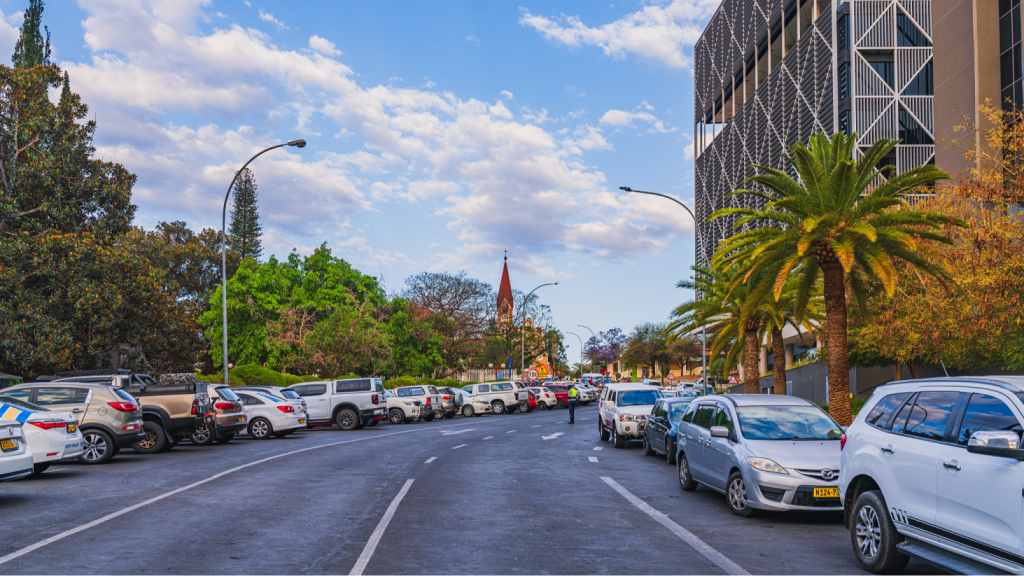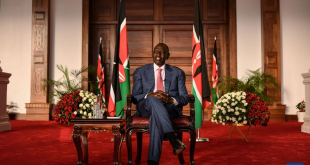By Ibrahim Khalil Ahasan

A view of Windhoek, capital city of Namibia, October 5, 2024. /CFP
Chinese Foreign Minister Wang Yi has embarked on a trip to four African nations including Namibia, the Republic of the Congo, Chad and Nigeria from January 5 to 11 to promote China-Africa relations in a more positive direction.
The visit maintains the continuity of the tradition of Chinese foreign ministers visiting Africa on their first overseas trips at the beginning of the year for 35 consecutive years since 1991. It holds great significance for demonstrating China’s continuous commitment to this ever-evolving friendship and the development of the Global South, facilitating the implementation of the outcomes of the 2024 Summit of the Forum on China-Africa Cooperation (FOCAC), deepening practical cooperation in various fields and promoting the sustained and in-depth development of China-Africa relations in 2025.
The connection between China and Africa represents China’s long-term vision for the development and prosperity of the Global South as well as cross-continental diplomacy and economic cooperation. Both Africa and China recognize the importance of collaborating in the areas of peace and security, economic integration throughout Africa, supply chain stability and Asian-African cross-continental prosperity. This history of cooperation between the two sides forms the basis of their further expansion of their diplomatic and strategic ties.
The Sino-African relationship saw many successes in 2024, including China’s unwavering and continuous support for Africa in pursuing a modernization path that fits their own national circumstances, charting a multilateral cooperation framework like the Beijing Action Plan (2025-2027) adopted at the FOCAC Beijing Summit, dynamic economic cooperation under the Belt and Road Initiative (BRI), strong high-level exchanges, high-quality trade growth and multiple climate cooperation.
As China has continued to be Africa’s top commercial partner for 15 consecutive years, fruitful results were obtained via collaboration on technology transfers, talent development and capacity building in a variety of industries, including manufacturing, logistics, infrastructure, medicine, the digital economy and agriculture.
With Wang’s visit this year, the prospects for 2025 begin to seem more stable, prosperous and promising, from addressing common challenges to pursuing common growth. Since China and Africa’s economies are highly complementary, Africa’s strategic pursuit of the UN’s 2030 Sustainable Development Goals and modernization drive are likely to result in increased cooperation between the two countries, with win-win partnerships and multilateral cooperation frameworks playing a crucial role.
Partnerships in energy, including green technology and renewable energy, trade diversification and agricultural modernization might be the first step toward greater economic cooperation and the establishment of long-term, mutually beneficial commerce. China’s increasing influence in areas like new energy, environmental development and technology advancements fits nicely with Africa’s economic requirements. Further strengthening the linkages, Chinese green and tech products, known for their quality and affordability, have found a ready market in Africa.
A train on the Lagos Rail Mass Transit (LRMT) Blue Line, which is a flagship project of the China-proposed Belt and Road Initiative, pulling in the Marina Station in Lagos, Nigeria, March 2, 2024. /Xinhua
As demonstrated by initiatives like the BRI and Global Development Initiative, economic endeavors are expected to be interwoven with strategic objectives. Multilateral forums such as the Belt and Road Forums for International Cooperation, FOCAC and bilateral mechanisms like the continuous high-level exchanges, will all be imperative for communication and stability. An excellent beginning to this path is represented by Wang’s current trip to Africa.
China’s commitment to the 10 partnership action plans for 2025-2027 and the declaration on jointly building an all-weather China-Africa community with a shared future for the new era drew a blueprint for future China-Africa ties in industrialization, poverty alleviation, employment generation, agricultural modernization, Africa’s technological progress, digitalization and green transformation, for advancement of the modernization of both Africa and China.
In addition to dealing with economic vulnerabilities, climate change, debt burden and the complicated global geopolitical environment, African countries also face challenges related to Western hegemony, sustainable finance, long-term and high-quality investment plans, employment generation and economic sustainability. Maintaining rock-solid partnerships with China can really support Africa’s long-term progress.
For example, given that China pledged to provide 33 African nations with a zero-tariff treatment, develop 30 infrastructure connection projects in Africa, implement 1,000 “small and beautiful” livelihood projects, generate at least one million employment opportunities for Africa and more, these types of support could be essential to advancing the Agenda 2063 in Africa.
Moreover, China’s unswerving opening-up is crucial to the Global South’s trade prosperity because it reduces trade imbalances and supports global free trade, economic globalization and the division of labor. For instance, thanks to the creation of a “green channel,” there are now more opportunities for African agricultural goods to reach the Chinese consumer market.
Building stronger links involves more than simply commerce or collaboration in the energy or agricultural sectors; it also entails establishing China and Africa as participants in a wider range of international systems. In 2025, both must start to build a new narrative centered on cooperation, multilateralism, intercontinental solidarity, international peacebuildingand sustainable development by strengthening their links. The visit by Wang at the beginning of 2025 marks a new beginning for this.
Ibrahim Khalil Ahasan, is a special commentator on current affairs for CGTN, is a Bangladesh-based independent columnist and freelance journalist who writes on contemporary international issues.
cgtn.com
 Africa -China Review Africa -China Cooperation and Transformation
Africa -China Review Africa -China Cooperation and Transformation
